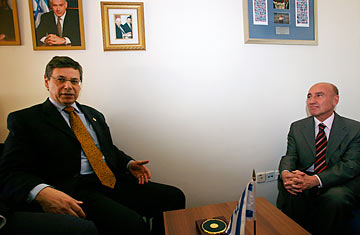
Israeli Deputy Foreign Minister Danny Ayalon, left, meets with Turkey ambassador Ahmet Oguz Celikkol in Jerusalem
Israel has no foreign policy, only domestic politics. That was former U.S. Secretary of State Henry Kissinger's conclusion back in the 1970s, but it appears to still hold true three decades later when it comes to understanding the latest fiasco in an Israel-Turkey relationship that has seen better days.
The fire was set on the evening of Jan. 11, when Israel's Deputy Foreign Minister, Danny Ayalon, summoned Turkey's ambassador Ahmet Oguz Celikkol to an urgent meeting. Its purpose was to deliver Israel's complaints about a Turkish TV series that portrays Israeli soldiers as baby killers. At the meeting, Ayalon was caught on camera instructing the Israeli TV news crew covering the event to make sure that its footage captured the fact that Celikkol had been deliberately seated on a chair lower than that of his Israeli counterpart, that only the Israeli flag was on the table (without the Turkish one, as would be the norm at a diplomatic photo op) and that Ayalon and his colleagues are not smiling at the ambassador. The symbolic humiliation of the Turkish diplomat was a well-planned if clumsy expression of the new policy of Ayalon and his boss, hard-line Foreign Minister Avigdor Lieberman, who have decried what they see as the tendency of Israeli diplomats to ingratiate themselves with foreign interlocutors. The offending Turkish TV program, Ayalon seemed to believe, was not a moment for diplomatic niceties; national pride demanded a retaliatory humiliation of the Turks.
Predictably, Ayalon's televised stunt was taken as an intolerable national insult in Turkey, whose moderate Islamist ruling party is more inclined than its predecessors have been to express harsh criticisms of Israeli actions, in line with Turkish public opinion. But even the usually critical opposition joined hands with the government in denouncing Ayalon's action, which was taken as a humiliation of the Turkish people as a whole. Within hours, President Abdullah Gul had issued a formal ultimatum that unless Israel issued a formal public apology, Turkey — by far Israel's most important ally in the Muslim world — would recall its ambassador. Initially, Ayalon folded his arms and said he had nothing for which to apologize.
Ayalon's theatrics struck a blow at a relationship as important to Israel as it has become fragile in recent months. Turkey, a NATO member that shares borders with such key Israeli adversaries as Syria and Iran, has long had a close relationship with the Jewish state, particularly at the level of military cooperation. Sources within Israel's Defense Ministry expressed concern that the Ayalon-Celikkol incident might imperil the visit to Turkey by Defense Minister Ehud Barak that is scheduled for Jan. 17. Barak plans to offer Turkey's military establishment an even tighter relationship with Israel. Already, the security relationship between the two states involves hundreds of millions of dollars in trade, while their intelligence communities cooperate closely on counterterrorism.
Given the stakes in the diplomatic spat, Ayalon's defiance potentially carried a high cost. But it took a behind-the-scenes intervention of the proverbial grownup in the Israeli establishment — President Shimon Peres, who served for decades as Israel's key diplomat — to orchestrate a climbdown. Peres called Prime Minister Benjamin Netanyahu and Foreign Minister Lieberman and urged them to defuse the crisis. But domestic politics was in play: not only was Ayalon's initial action calculated to burnish the nationalist appeal of his and Lieberman's Yisrael Beitenu party, but Netanyahu's need to maintain that party's support for his coalition prompted him to initially issue a feeble statement through his aides that was regarded in Turkey as an endorsement of Ayalon's actions.
Ayalon remained defiant, on Tuesday issuing a statement of regret over the incident that nonetheless reiterated his belief that he had acted correctly in taking Turkey to task. "My protest of the attacks against Israel in Turkey still stands," Ayalon said. "However, it is not my way to insult foreign ambassadors, and in the future I will clarify my position by more acceptable diplomatic means." But insulting a foreign ambassador was exactly what Ayalon had set out to do, and the Turks on Wednesday rejected his "apology" as insufficient.
Finally, on Wednesday, as the clock ticked down on Turkey's ultimatum, Ayalon came out with a full, written formal apology that satisfied the Turkish Foreign Ministry. "I had no intention to humiliate you personally and apologize for the way the démarche was handled and perceived," he wrote. "Please convey this to the Turkish people for whom we have great respect ... Although we have our differences of opinion on several issues, they should be discussed and solved only through open, reciprocal and respectful diplomatic channels between our two governments."
The week began with Turkey needlessly slapped in the face, but by Wednesday, it was the turn of Israel's Foreign Ministry to suffer a public humiliation, being forced to grovel for Ankara to accept its apology. "Those who thought that nominating Lieberman to be Foreign Minister would not create problems for Israel were once more shown to be mistaken," a senior Israeli official speaking on condition of anonymity told TIME. "It was a disgrace to us all as Israelis." The Israel-Turkey relationship looks likely to absorb this week's contretemps, with neither side looking to escalate. On both sides, the strategic ties are driven by mutual national interests that trump internal politics.
